Reviving the Dream of a Free Flow of Information
Vijay Prashad showcases the closing statement issued by hundreds of editors and journalists who gathered in Shanghai in early May for the Global South International Communication Forum.
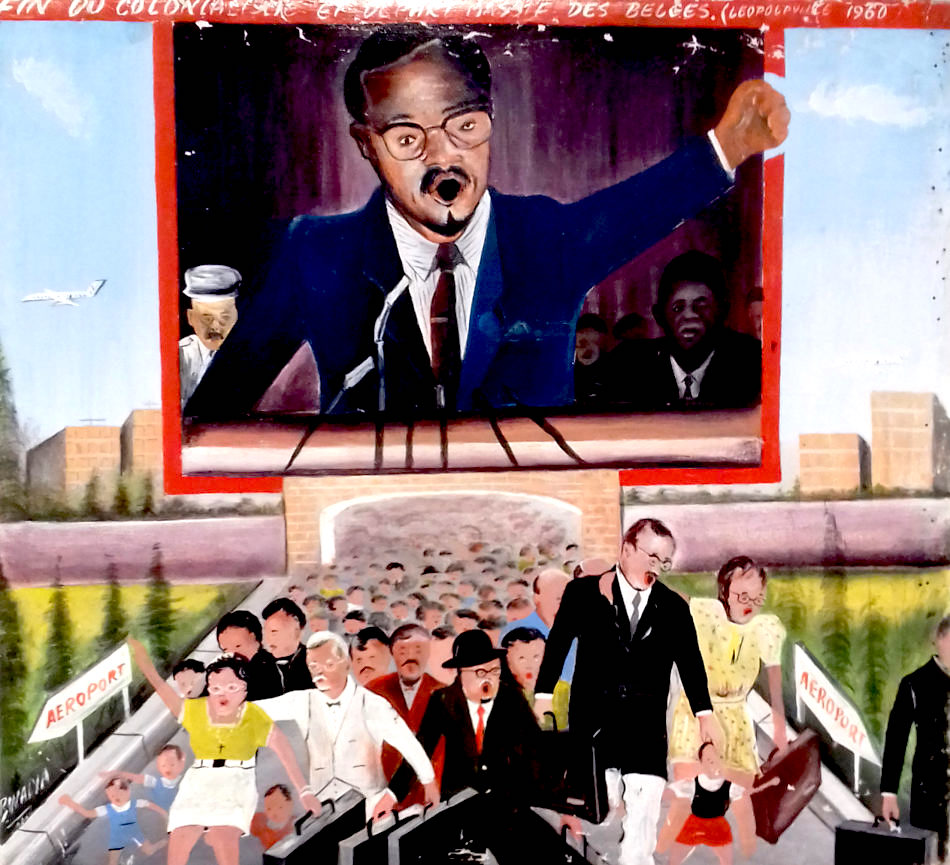
Dominique Bwalya Mwando, Democratic Republic of the Congo, “Lumumba’s Speech,” 2005.
By Vijay Prashad
Tricontinental: Institute for Social Research
 It is remarkable how the media in a select few countries is able to set the record on matters around the world.
It is remarkable how the media in a select few countries is able to set the record on matters around the world.
The European and North American countries enjoy a near-global monopoly over information, their media houses vested with a credibility and authority inherited from their status during colonial times (BBC, for instance) as well as their command of the neocolonial structure of our times (CNN, for instance).
In the 1950s, the post-colonial nations identified the West’s monopoly over media and information and sought to “promote the free flow of ideas by word and by image,” as the 1945 Constitution of the United Nations Educational, Scientific, and Cultural Organisation (UNESCO) put it.
As part of the Non-Aligned Movement, the countries and regions of Africa, Asia and Latin America developed their own national and regional news institutions.
In 1958, a UNESCO seminar held in Quito, Ecuador, led to the establishment of a regional school to train journalists and communications professionals in 1960, known as the International Centre of Advanced Communication Studies for Latin America (CIESPAL); in 1961, a meeting held in Bangkok created the Organisation of Asia-Pacific News Agencies(OANA); and in 1963, a conference held in Tunis created the Union of African News Agencies (UANA).
These agencies tried to amplify the voices of the Third World through their own media, but also — unsuccessfully — within the media houses of the West.
Alongside these efforts, at the UNESCO General Conference of 1972, Soviet Union and UNESCO experts from more than a dozen countries put forward a resolution entitled the “Declaration of Guiding Principles for the Use of Satellite Broadcasting for the Free Flow of Information, the Spread of Education, and Greater Cultural Exchange,” which called for nations and peoples to have the right to determine what information is broadcasted in their countries.
Like other such efforts, it was opposed by Western states, with the United States at its helm. Although conference after conference, from Bangkok to Santiago, took the issue of the democratisation of the press seriously, this opposition meant that little advancement was possible.
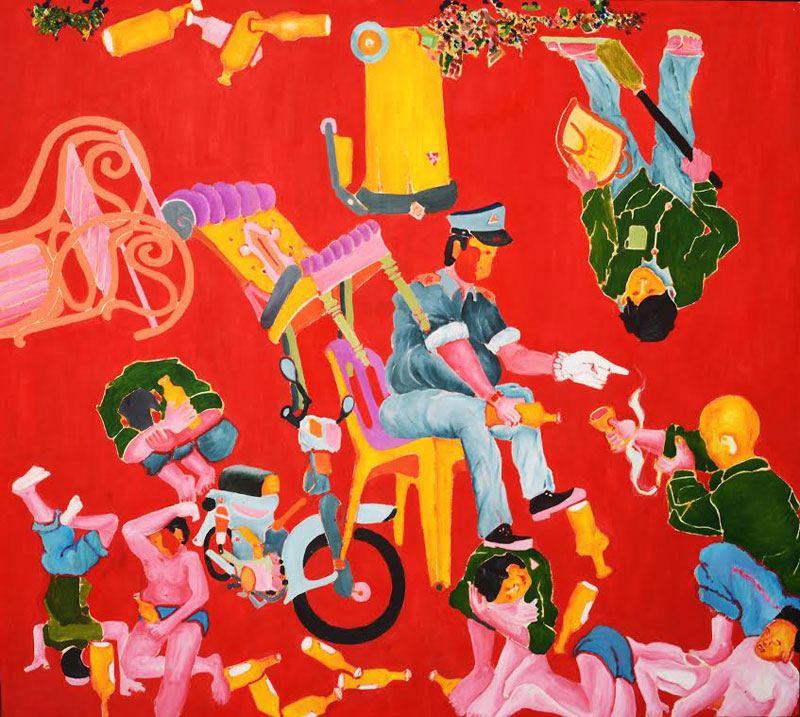
Meas Sokhorn, Cambodia, “Inverted Sewer,” 2014.
In the 1970s and 1980s, these efforts came together in the movement to build the New World Information and Communication Order to address the global imbalances in this sphere between developed and developing countries.
This idea was influential on UNESCO’s International Commission for the Study of Communication Problems, or MacBride Commission, established in 1977 and chaired by the Irish politician and Nobel laureate Seán MacBride, which produced an important, but little-read, report on the topic, “Many Voices, One World,” 1980.
In 1984, the United States withdrew from UNESCO in response to these initiatives. The privatisation of the media in the 1980s ultimately killed off any attempt by the Third World to create sovereign media networks — even where these networks were anti-communist (as with the Asia-Pacific News Network, established in Kuala Lumpur, Malaysia in 1981).
Revival
However, in recent years, this dream of the free flow of information has been revived by movements of the Global South, which have been frustrated by the near-total absence of their views in international debates and by the imposition of a narrow, foreign worldview on their countries about the dilemmas that they face (war and hunger, for instance).
As part of this revival, hundreds of editors and journalists from the Global South gathered in Shanghai in early May for the Global South International Communication Forum. At the close of two days of intense debate, the participants drafted and voted on a Shanghai Consensus, which can be read in full below:
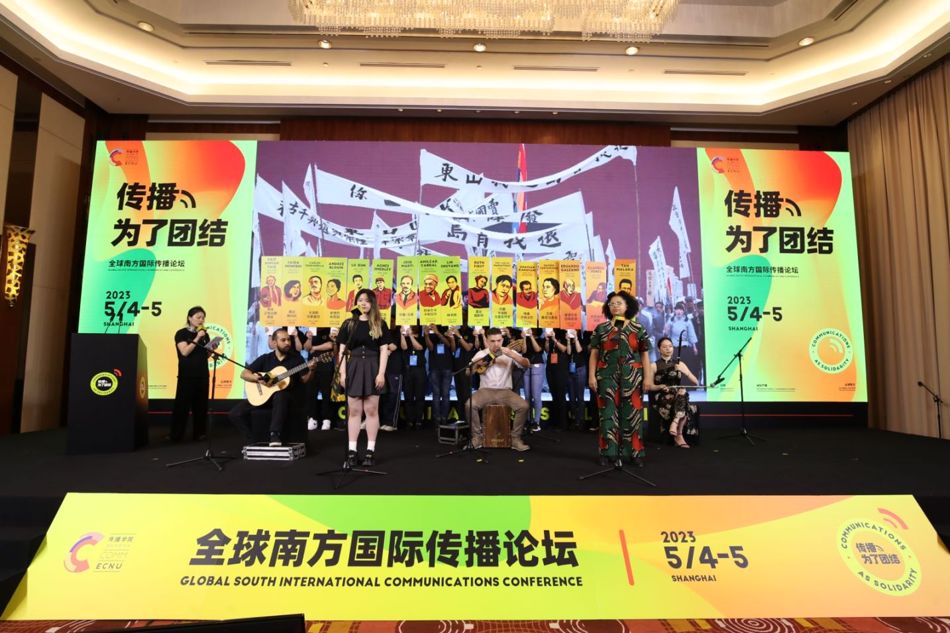
Opening cultural performance of the Global South International Communication Forum, 4 May 2023. (International Communication Research Institute of East China Normal University)
Promoting the Construction of a 21st-Century New World Information & Communication Order
“In the 1970s, as part of the process by the Non-Aligned Movement to establish the New International Economic Order, the states of the Global South along with UN Educational, Scientific, and Cultural Organisation (UNESCO) attempted to establish the New World Information and Communication Order. This attempt was destroyed by the rise of neoliberal hegemony during the 1980s.
The wave of neoliberal globalisation accelerated due to the Third World debt crisis and the demise of the Soviet Union. The West established a ‘rules-based international order’ to mask its neocolonial structures and imperialist actions. Samir Amin argued that the neocolonial structure is built on ‘five controls’: over finance, natural resources, science and technology, weapons of mass destruction, and information.
Today, although some of these monopolies have loosened, the unequal structure of information and communication has not only remained unchanged but has also become more severe.
The dominant theoretical paradigm on information production and communication worldwide remains Western-centric, and the Global South’s academia and media lack mechanisms to generate ideas and a framework that goes beyond the Western-centric perspective.”
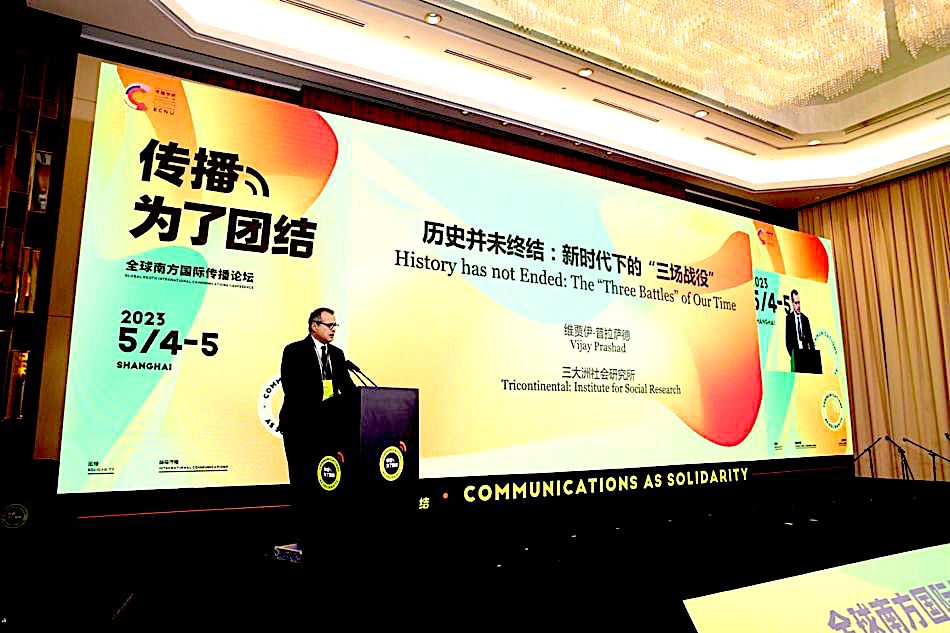
Vijay Prashad, director of Tricontinental: Institute for Social Research, gives the keynote address, “History Has Not Ended: The Three Battles of Our Time,: 4 May 2023. (International Communication Research Institute of East China Normal University)
“We note the prevalence of neocolonial structures, in particular in the media, which are controlled by the West. This media is unable to articulate the challenges faced by the world’s people or effectively communicate and discuss feasible development strategies, in particular for the Global South.
US imperialists and their allies weaponise the media, launching information wars against countries in Asia, Africa, and Latin America. If the Global South tries to put peace and development on the agenda, the West answers with war and debt. In the hands of Western media monopolies, the communications order is not used to promote world peace, but to exacerbate human division and the risk of war.
US imperialists and their allies use media hegemony to distort the beautiful concepts of democracy, freedom, and human rights. They attack other countries under the pretext of democracy, freedom, and human rights while remaining silent about their own trampling of democracy, deprivation of freedom, and human rights.”
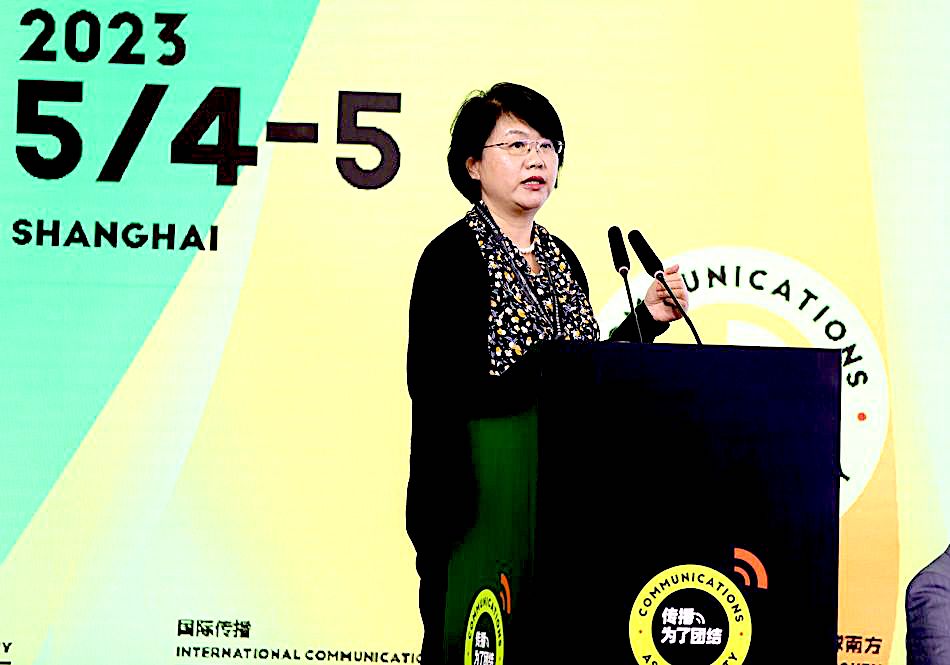
Professor Lyu Xingyu, dean of the International Communication Research Institute of East China Normal University, gives the closing remarks of the Global South International Communication Forum, 5 May 2023. (International Communication Research Institute of East China Normal University)
“Digital technologies such as the internet, big data and artificial intelligence, which should serve human welfare, are used by a few Western media giants and monopoly platforms to dominate the production and dissemination of information and to block voices that differ from their claims.
Given these circumstances, we believe that it is essential for intellectuals and communications professionals from and sympathetic to the Global South to revive the spirit of the 1955 Bandung Conference and the Non-Aligned Movement (established in 1961), respond to the Global Civilisation Initiative (2023), and establish international solidarity through communications theory and practice.
We believe that it is essential for intellectuals from and sympathetic to the Global South to promote the theoretical syntheses and academic production of the Global South (especially in the arenas of history and development), actively engage in academic exchanges and collaboration, and form a communications theory from the perspective of the Global South.”
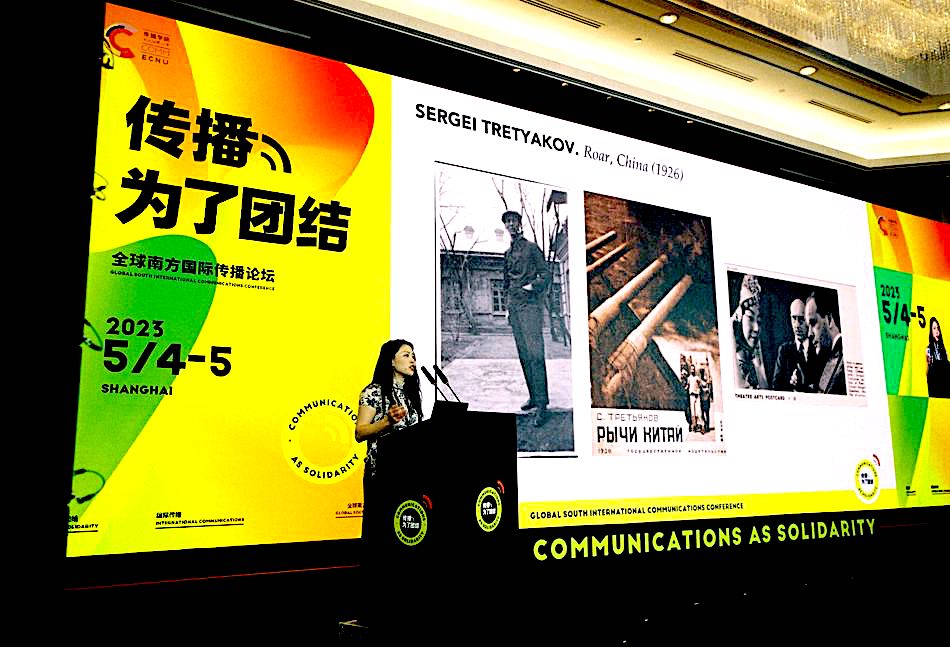
Tings Chak, Dongsheng co-founder and director of art at Tricontinental: Institute for Social Research, delivers a speech entitled “Third World Culture, Communication, and Solidarity,” 4 May 2023.
“We believe that it is essential for progressive media from and sympathetic to the Global South to form a distributed and diversified content production and dissemination network, share content and media experiences, and establish a united international communications front against imperialism and neocolonialism to advocate for peace and development.
We believe that it is essential for the Global South International Communication Forum to be held annually in order to build a diverse and multilateral network and platform for dialogue and exchange among intellectuals and communications professionals. This network and platform will serve as a basis for various forms of collaboration with governments, universities, think tanks, media, and other institutions.
The historical mission of the New World Information and Communication Order has not been fulfilled, nor has the spirit behind it been eradicated. Anti-imperialism and anti-colonialism are still the consensus of the new Non-Aligned Movement. Let us work together, based on this foundation, to promote the construction of a twenty-first-century New World Information and Communication Order to benefit humanity.”
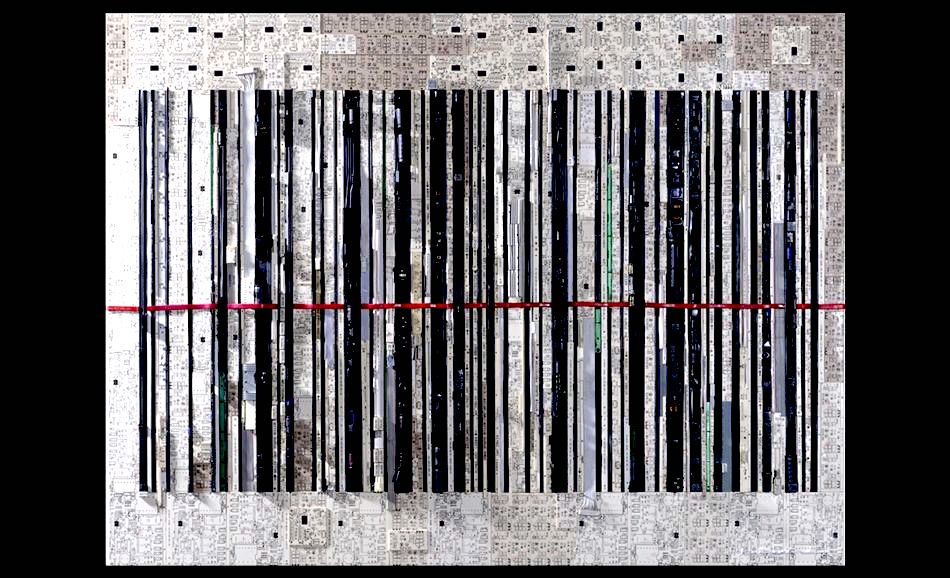
Nor Tijan Firdaus, Malaysia, “Just Scan It,” 2021.
The Tricontinental: Institute for Social Research, is in broad agreement with the need to further the New World Information and Communication Order and revive the dream of the free flow of ideas.
This endeavour is built upon efforts of the past, such as the Non-Aligned News Agencies Pool, formed by the Yugoslav news agency Tanjug on 20 January 1975, which brought together 11 news agencies. In its first year of operation, the agencies shared 3,500 stories; a decade later, there were 68 news agencies in the network.
Though the Non-Aligned News Agencies Pool is now extinct, the idea behind it remains vital. The recent conference in Shanghai is part of the new conversation to build new pools, new networks, and new media, anchored organisations such as Peoples Dispatch and like-minded media projects.
Vijay Prashad is an Indian historian, editor and journalist. He is a writing fellow and chief correspondent at Globetrotter. He is an editor of LeftWord Books and the director of Tricontinental: Institute for Social Research. He is a senior non-resident fellow at Chongyang Institute for Financial Studies, Renmin University of China. He has written more than 20 books, including The Darker Nations and The Poorer Nations. His latest books are Struggle Makes Us Human: Learning from Movements for Socialism and, with Noam Chomsky, The Withdrawal: Iraq, Libya, Afghanistan, and the Fragility of U.S. Power.
This article is from Tricontinental: Institute for Social Research.




Geen opmerkingen:
Een reactie posten